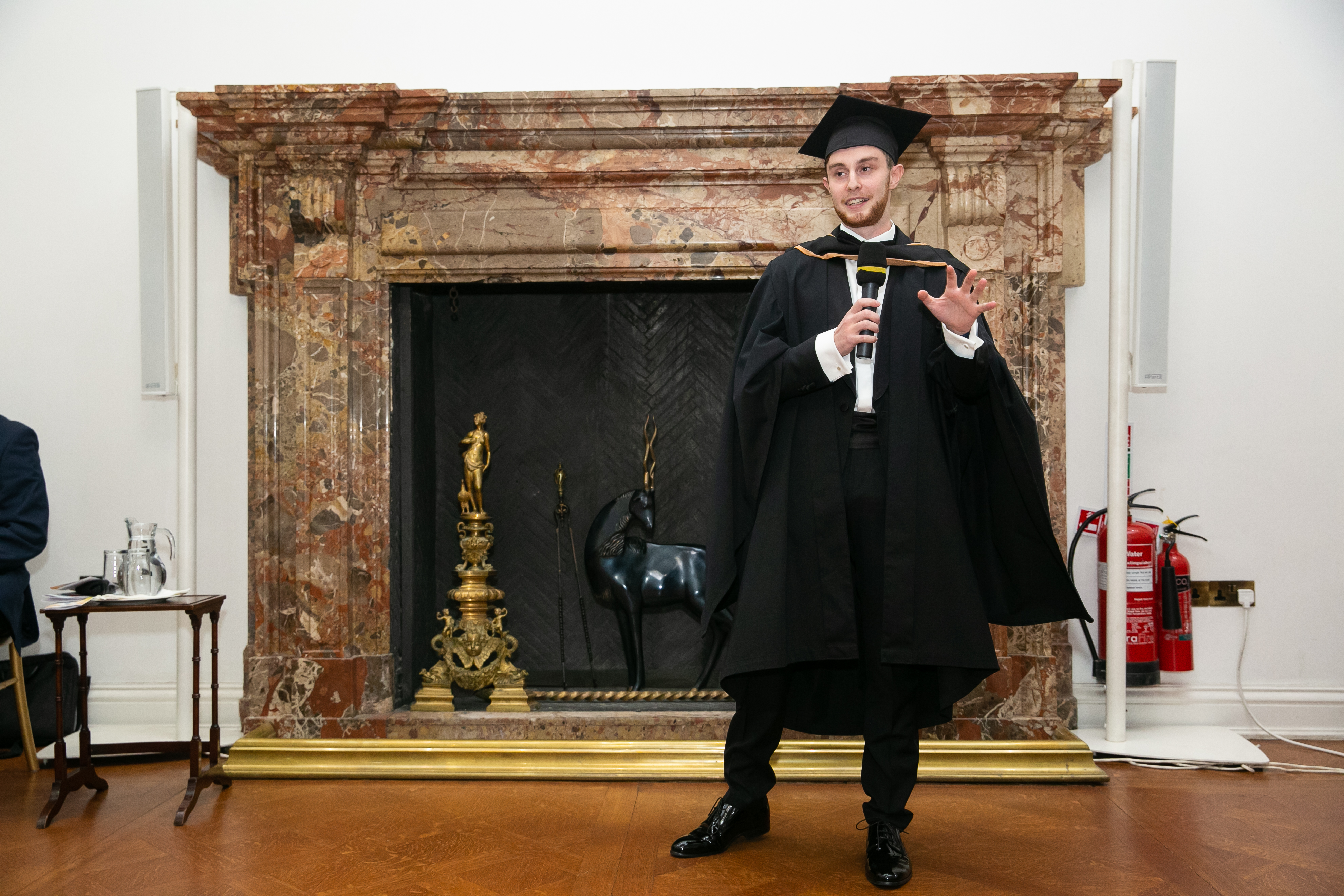"ICEF Students Are Most Talented and Ambitious Students Ever"

Daniil Tsinman earned his bachelor's degree from ICEF in 2020 and his master’s from the London Business School in 2021. Currently an Associate Consultant at BCG office in Moscow, Daniil combines his job with lecturing at ICEF. In this interview, he shares why stepping out of one’s comfort zone is not without advantages, how to choose the right master’s degree, and why the Russian consulting sector looks more lucrative than abroad.
About choosing the right degree
I can’t say my choice of university and faculty was a challenging one. I made up my mind that I’d enroll in ICEF and study economics in my high school years, so they went quite smoothly for me. Economics as a major attracted me by its universal nature. It gives that foundation that has room for further academic choices – and Finance is just one of them. And because Economics isn’t a niche degree, it opens up careers in a lot of fields. My parents both work in finance. Their career paths are an example for me of how economics education can work out for people in real life.
I knew that the alternative careers such as auditing, trading, consulting would always stay open for me. These beautiful words were yet to be learned, but at least I had the understanding that I didn’t have to make my choice right there, right then. And it is obvious, of course, that economics is hands-on, not something you just learn, get a grade in, and forget. The moment I got that missing piece, the choice of school ceased to be a puzzle. HSE has always set itself apart from other schools by its teaching culture, unique community, and choice of faculties and programmes.

ICEF, in turn, looked an attractive provider of excellent international education in economics. The diploma of the University of London, the opportunities to study and work abroad, the widened horizons – all of it is true. I attended a couple of Open Days, checked ICEF website, and applied.
However, the choice of programme track had to be done faster than I would’ve liked. At ICEF, students are expected to decide on their further academic track in their first year, before spring. Management sounded too abstract to me – I saw it as a thing to be better explored in the workplace. I chose Economics and Finance. Incorporated in this track is data analysis, social studies of financial behavior, banking, among other courses. And even though Finance wasn’t exactly what I wanted to study, the knowledge assets ICEF had me equipped with were more than excellent by the end of my study.
About the advantages of challenges
Alongside the essential skills, you learn to be incredibly efficient. At ICEF, you are expected to cope with an incredible number of deadlines per week, even per day, which is very important. It can be difficult at ICEF, true, but it is also fascinating. The efficiency you discover yourself capable of, it helps you cope with obstacles that seem to never end. For me – fresh high school graduate, the smartest of the smart, with ambition to top the student ranking and land at least vice-president position at a premier company – – the biggest challenge was adapt to the environment at ICEF.
After a couple months you face your first exam session and the fact you are not the only brightest student in the class. There are many others at ICEF just like you
You’re forced out of your comfort zone. Enough to make some feel discouraged, but not me. I set myself up for a breakthrough. I was going to show what I was really capable of. It was a matter of passing through that initial stage when you find yourself amid the people who are really smart and talented. This can be a major challenge, and a demotivating one. In this sense, ICEF is the right place to learn that making your way up to the top of the class is always through hard work – exactly how we all go forward in career. Besides, coupled with success in ICEF’s frequent exams, the thinking like this acts as a shot of adrenaline.
About the class of 2020
In the March of 2020, we learned that all our courses were going to be moved online and we wouldn’t get to see our teachers and classmates. It was an interesting experience. We, the class of 2020, are special in this respect. When I think about the effort our lecturers had put into converting their courses into online format, within a record short time and without loss in quality, I think of them with admiration.
I maintain that higher education should unfold through constant dialogue. When moving its courses online, ICEF was able to maintain its usual high quality of education. The understanding and the feedback – on the side of the students and the teachers - was incredible. That situation showed what a cohesive team we are.
The admission process in my master’s programme in London, and the study itself, was, however, offline. We had online classes only in December before Christmas.
About studying at LBS
The idea of doing a master’s came to me after my second year of study. I wasn’t quite sure which career path to take on, so I thought it might be useful to spend another year studying. As a school student I dreamed about studying abroad. In my third year, when I finally decided on my career field – consulting – I started looking for a master’s degree in management. At first, my choice was driven solely by university ranking. I was choosing among Harvard, MIT, Oxford and Cambridge.

Then, some people told me I should rather look at the career pathways of the graduates – how many of the school’s alumni actually end up in the consulting companies and which of the employers I might later apply for a job. And just like that, I’ve narrowed my choice of the top business schools down to one, London Business School. By the beginning of my fourth year, I had Plan A and I’m glad I didn’t have to use Plan B or C.
The strength of economics education at ICEF lies in its array of courses, designed to prepare students for further study in their main subject or related majors. I coped easily with much of the learning material at LBS precisely thanks to my background from ICEF. I would use the notes I made during my bachelor's degree whenever I needed a brush-up on my knowledge, and that helped me make fast progress.
The reason for my choice of LBS was also that its courses were less focused on accurate calculations and more on sharpening the intuitive business thinking. I felt, from that high hill of my knowledge, it was time to synthesize, break down, draw conclusions and be able to explain the business processes – the skills essential at the start of one’s work experience, when you need to have convincing arguments to prove a point. Besides, with my background from ICEF I spent far less time digesting theories than other students. And my ability to work systemically explains why I was able to make time for job search and personal life.
About job search
I have to admit that searching for job proved a stressful experience. That’s because master’s degrees in London have a duration of one year only. You realize it’s after a few months, not year, that you’ll join a team of professionals as a professional. The beauty, and challenge, of the consulting world is that you have to land the offer six months before you enter the workplace.

The time you have to get your act together is short and coincides with your studies. Two things helped me cope with stress: knowing that I wanted to work in consulting, which narrowed my search down, and LBS’s fine-tuned employer-student communication. LBS has a whole array of trainings to prepare students for the workforce, but if it wasn’t for the skills I got from ICEF – indefatigable industry, handling countless deadlines, self-reliance – it would have been much harder for me.
About why I chose to work in Russia
For me, consulting is about developing a client’s business by advising on how it can be improved and offering fresh ideas. In this sense, consulting as a service is more sought-after on emerging markets, with much more challenges to tackle. As a professional, you feel needed, you have lots of exciting tasks, and you even have the power to influence the business.
The overseas consulting market is tailored to the needs of the mature businesses, which, unlike in newly created Russian economy, have fewer challenges
On an emergent market, the problems are always on the surface, so identifying the best solution for the client is the most exciting part of the consultant’s job.
Russia and other developing countries are just a fresh ground to work over and build a consulting career pretty fast. One can choose among petroleum sector, banking, manufacturing – and more so, consulting is still perceived in Russia as a sector with strong influence on business sector.
The opportunities abroad may not be that lucrative, now that the international consultancy market has safely passed its growth stage to mature. I currently work in BCG office in Moscow. None of our projects can ever be put on hold: they all are equally important to us. When you work in consulting, you cannot afford to waste time and budgets, and the responsibility is big.
About how I became a teacher
Leaving the environment where you grew up, made friends and experienced achievements is never easy. I realized I wanted to stay a part of ICEF. The only problem was the “mode of my affiliation”. With the onset of the online mode, working in consulting, as in many other jobs, offers a much better work-life balance. People are now free to pursue personal growth and learning without detriment to their health. I teach at ICEF only on Saturdays. BCG has a completely weekend-free work schedule.

Why do I like teaching? There are several reasons, one being that I would like to contribute to ICEF’s further growth. I can make a change – on the educational side and creativity. Moreover, explaining things to students and going deeper into the subject with them is a highly satisfying feeling. When you are a fresh graduate yourself, the nuances of the teacher-student communication and learning material are still fresh in your head. Your job now is to deliver the subject in the way you would like it to be delivered to you.
The reward you get in the form of excellent student performance is one more source of satisfaction. ICEF students are the most talented and ambitious ever.
It’s a cool feeling you get when you see your messages get home and hear students ask questions beyond the official learning material
I can’t even find the words to describe how rewarding my job is in terms of students’ interest. For me as a consulting expert, teaching is also a great opportunity to practice my argumentation skills. Business consulting is about people who need to be approached professionally.
I am very glad that I, as an employee of BCG, have access to the talent pool of ICEF students. It might be that I will be able to move ICEF-consultancy sector and BSG relations to a whole new level – through ICEF Career Services.
About the people of ICEF
I joined ICEF as a teacher this year, so I can judge about its learning process from the inside and the outside. The people here seem to be united by purposefulness and the high bar they have set for themselves in life in general, which I never encountered elsewhere. Their being personally demanding is visible in whatever they undertake, be it finance, culinary school or theater. Their efforts and pathways just can’t leave people indifferent. And be sure, you will forget scrolling through social networks once you find yourself amid such ambitious classmates. And your personal performance will increase, too.
You see this sparkle of interest in students’ eyes and you know they aren’t here for some good time. They want to get the most out of their studies, attain success and they are really working for it. An attitude like this is gold to ICEF faculty staff.